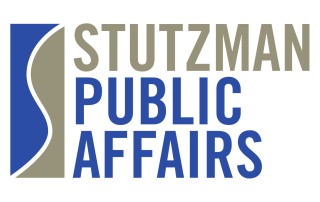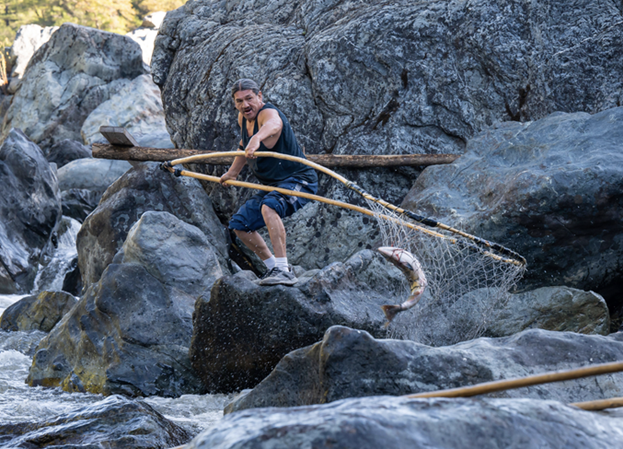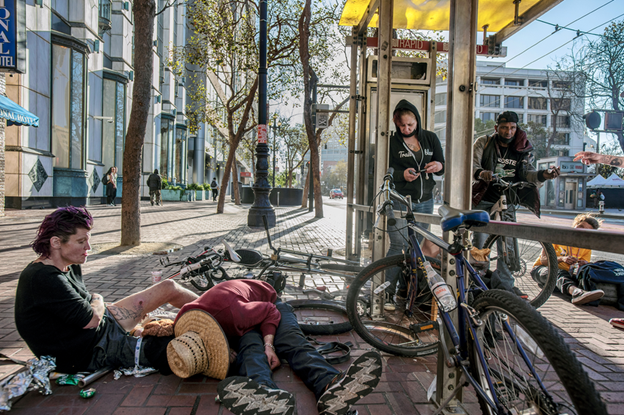3rd Annual Journalism Awards Contest Recipients
Congratulations to the winners of the 3rd Annual Journalism Awards Contest for politics and policy reporting in California. The best work from 2022 was honored at our Journalism Awards Reception on March 29, 2023 at The Mix.
This award honors the California journalist whose work has had a substantial impact on the state. The Sacramento Press Club board will accept and vote on nominations from independent news organizations or a colleague of the journalist. A nomination letter must detail, with links to published work, why the journalist should be recognized. To qualify, a journalist should have published work that reflects the best of our profession: stories that reveal egregious wrongs committed against powerless populations, that force change in public policy decisions at the state level, or that provide a powerful public service to Californians, including comprehensive coverage during emergencies. This is not a team award, nor will it be given to an institution. It is intended to recognize a singular achievement by a journalist that benefits Californians.
Sam Stanton – The Sacramento Bee
The Sacramento Bee editor who nominated Sam Stanton for journalist of the year called him a weight-bearing-wall of a journalist. We agree. In 2022, he wrote sensitive stories about men abused as children who sued before the California Child Victim Act deadline. He repeatedly held power to account, relying upon court and other documents. Stanton scrutinized the CHP’s decision to give an officer his service weapon back, despite that man’s threats to kill and commit suicide. Then the officer used the weapon to kill his ex-wife and shoot her boyfriend before killing himself. Stanton led The Bee’s coverage of a mass shooting in downtown Sacramento and was first to report one of the shooters was recently released from prison over the objection of DA Anne Marie Shubert, reigniting debate over California’s sentencing policy. When Shubert ran for attorney general, lost, and retired, Stanton wrote the definitive profile. He followed with deep profiles of Sheriff Scott Jones after his failed bid for Congress, and of former Assemblymember Jim Cooper, who was elected Sacramento’s sheriff. Sometimes though, the most important job of a journalist is to connect with readers. Stanton told the tale of Cedar the Goat, loved by a little girl but purchased for slaughter by state Sen. Brian Dahle at the Shasta District Fair. The ensuing battle to save Cedar — with the girl’s family and the Senator on the same side — is a story that holds law enforcement to account. That was the brilliance of Sam Stanton in 2022: Even a poignant tale is, in the end, about transparency and accountability.
FEDERAL COURTS
“‘Everything was done wrong.’ Why was this suicidal CHP officer given back his gun?”
“A California girl wanted to keep her baby goat alive. Her county fair killed it anyway”
“Exclusive: Catholic high school sues Sacramento donors after family moves to halt sale of house”
“A train cut off California man’s legs while he lay on tracks. Does he deserve $57 million?”
“Surprise witness: Man who lost legs while laying on California train tracks was trying suicide”
“Attorney behind thousands of Northern California ADA lawsuits pleads guilty in tax case”
“Lawsuit over inmate death adds to scandal surrounding guards at California prison”
“Should Zeus the puppy be put to death? Judge issues stay after owner sues Elk Grove”
“Zeus’ owner taken into custody as suicide threat after Elk Grove officials kill her dog”
“‘Worst decision of his life.’ Jan. 6 defendant from California seeks leniency at sentencing”
SHERRI PAPINI
“Exclusive: Sherri Papini accepts plea deal, will admit her ‘kidnap’ was all a hoax”
“‘Super mom’ Sherri Papini sentenced to 18 months in prison for California kidnapping hoax“”
“Hoodwinked: Sherri Papini’s kidnapping hoax played on sympathy and entangled innocent people”
SEX ABUSE LAWSUITS
“40 years later, five Capital Christian students say teacher tied them up, abused them”
“New lawsuits allege Sacramento youth pastor victimized at least 9 boys decades ago”
“Years after a Sacramento baseball coach went to prison for sex abuse, his players are suing”
BREAKING NEWS
“6 killed, 12 hurt in Sacramento shooting; police find gun, search for ‘multiple shooters’”
“At least 5 shooters involved in downtown Sacramento shooting, which police called gang-related”
“Exclusive: Suspect in Sacramento mass shooting was out of prison despite 10-year term”
“Father kills 4, including his 3 daughters, before shooting himself at Sacramento-area church”
“Sacramento church shooter was arrested for assaulting officer 5 days before killing daughters”
“DNA leads to arrest of homeless man in slaying of 20-year-old Rancho Cordova woman”
“Sacramento lawmakers say time has come to move homeless camps off American River Parkway”
“Mosquito Fire: Flames make furious run to 30,000 acres, burning homes in El Dorado, Placer”
“Wildfire updates: Investigators looking for leads for cause of Mountain Fire; Mill Fire holds”
This category recognizes exceptional journalism that holds powerful institutions and/or people accountable for their actions and, by doing so, leads to demonstrable change that benefits Californians. The submission should include a short cover letter explaining the impact or outcome of the work. Judges will consider overall impact, depth of reporting, and the use of today’s technology to reach the audience. Entries may be in any format including text, audio or video. Entries are limited to three stories.
WINNER
Adam Elmahrek, Paige St. John, Robert J. Lopez, Ruben Vives, Marisa Gerber, Kiera Feldman, and Brian van der Brug – The Los Angeles Times
This investigation into California’s dysfunctional and corrupt legal weed market, including several farmworker deaths, exposed what has been overlooked for years – regulators’ failure to protect the state’s cannabis workers. The LA Times’ investigative work, punctuated by sharp, powerful writing and evocative storytelling, spurred immediate governmental action. Within days, the California Department of Cannabis Control directed officers to investigate when they encounter evidence of labor exploitation or human trafficking. California’s workplace safety agency launched an investigation into farmworker deaths identified by The Times. Their work prompted lawmakers to call for hearings, introduce protections for cannabis workers and address the failure of cannabis regulators to investigate labor exploitation.
FINALISTS
Dale Kasler and Ryan Sabalow – The Sacramento Bee
“Exclusive: Paradise contractor indicted, accused of preying on Camp Fire victims”
Robert J. Lopez and Colleen Shalby – The Los Angeles Times
“‘Always have a knife with you’: Women and trans students fear harassment, hate at CSU campus”
“CSU provost faced retaliation after reporting harassment by president’s husband, records claim”
“Cal State pays millions to executives after they resign, with little oversight of what they do”
JUDGES
Ruby Bailey, consumer editor, USA Today; Mitchel Benson, former reporter, The Wall Street Journal; and Robert Salladay, former editor, The Sacramento Bee
This award will recognize a journalist or team of journalists who displayed exceptional courage to bring necessary coverage to the public, whether by standing up to powerful people, covering events such as wildfires that are inherently dangerous, or exposing themselves to personal harm during the coverage of extremists or others who threaten with intent to injure. A nomination letter must detail, with links to published work, why the journalist(s) should be recognized. The Sacramento Press Club board will accept and vote on nominations from independent news organizations or a colleague of the journalist.
WINNER
Brian van der Brug and Paige St. John – Los Angeles Times
“Dying for your high: The untold exploitation and misery in America’s weed industry”
Brian and Paige were nominated for their work as part of the team behind Legal Weed, Broken Promises, an investigation that required on-the-ground reporting and photography in remote areas where outlaw farms and seasonal camps are guarded with guns. Many sources faced possible retaliation if they talked. Media attention was unwelcome. During one trip, several men surrounded Brian and one used a tire iron to smash his rental car. Another told him “The only reason you don’t have a bullet in your head now is because you are talking to me.” Despite these dangers, Brian and Paige traveled multiple times into dangerous territory, documenting massive, unlicensed cultivation centers, heavily armed guards, fearful citizenry, and overwhelmed law enforcement. They found workers forced to live in squalor who often were not paid. Judges said their work represents the best of journalism, dangerous coverage that reveals serious problems that dramatically affect the quality of life for many Californians. We thank them for their tenacity and honor them with the Courage in Journalism Award.
Decisions large and small are made each day in the California Capitol that affect the lives of the state’s 40 million citizens. This category showcases a body of work that shows consistent daily excellence in beat reporting about the Capitol and/or state government. Entries must include five examples of work that demonstrate sharp and clear writing, an important scoop, coverage of breaking Capitol news or continuing coverage of a particular topic, and an ability to explain to readers why the daily workings of the Capitol matters in their lives. Entries can cover a single topic or different issues. Political newsletters are eligible and encouraged.
WINNERS
Alexei Koseff – CalMatters
“Gavin Newsom was the face of legal cannabis in California. Can he fix its problems?”
“‘When you don’t know where to go, you come here:’ California preps to be a haven for abortion rights”
“‘Forcing the hand’: Gavin Newsom leans into legislative agenda as first term nears end”
“Inside the team pioneering California’s red flag law”
“Buried treasure: California politicians stash $35 million in leftover campaign cash”
Alexei impressed with sharp angles about the people and issues shaping state politics and with his engaging prose. His CalMatters piece on the state’s cannabis industry deftly explored the pressure facing Gov. Gavin Newsrom to address problems with a change he championed. An analysis of leftover campaign cash shed light on the large and languishing political fund maintained by former officeholders.
Dustin Gardiner – The San Francisco Chronicle
“‘Deeply troubling’: How a police union worked to undermine California’s landmark police shooting law”
“Newsom refuses to mandate strict water cuts. Why his ‘bottom-up’ drought strategy is not working”
“‘Michael Jordan of COVID testing’: How these political operatives cashed in during the pandemic”
Dustin’s strong mix of stories demonstrated how decisions made in Sacramento impact the lives of Californians. The judges pointed to his stories on the divergent drought responses pursued by Govs. Jerry Brown and Gavin Newsom and the creative excuses cities have used to get around a new housing law as standout journalism.
JUDGES
A.G. Block, former editor, California Journal; Chase Davis, deputy managing editor, Minneapolis Star Tribune; Tom Dresslar, former Capitol Bureau Chief, The Daily Journal; Ginger Rutland, former editor, The Sacramento Bee; Dan Smith, former Capitol Bureau Chief, The Sacramento Bee; and Torey Van Oot, reporter, Axios
California’s elected officials have enormous influence over the lives of the people they represent. This category is for one specific story that either uncovers news that would not become public or explains to readers the context and import of Capitol decisions. This category recognizes journalism that takes a deeper look at the decisions made in the Capitol, the influences behind them and their effect on the broader public. Judges will be looking for exclusive reporting, a strong writing voice and how the story changed the public conversation or government decisions. A brief explanation of that impact should accompany the entry.
WINNER
Samantha Young – Kaiser Health News
“California Handed Its Medicaid Drug Program to One Company. Then Came a Corporate Takeover.”
In January of 2022, countless low-income Californians woke up to find they couldn’t get needed prescription drugs. Samantha Young dug into a private company’s botched takeover of the state’s Medicaid drug program and exposed a serious conflict of interest, as well as legal woes the company faced beyond the state’s borders. Moreover, her reporting, based on interviews, public records requests, and archived meetings, raised important questions about the state’s response to the situation.
FINALIST
Bernard Wolfson, Angela Hart, and Samantha Young – Kaiser Health News
“California Inks Sweetheart Deal With Kaiser Permanente, Jeopardizing Medicaid Reforms”
JUDGES
A.G. Block, former editor, California Journal; Chase Davis, deputy managing editor, Minneapolis Star Tribune; Tom Dresslar, former Capitol Bureau Chief, The Daily Journal; Ginger Rutland, former editor, The Sacramento Bee; Dan Smith, former Capitol Bureau Chief, The Sacramento Bee; and Torey Van Oot, reporter, Axios
The recall election of Gov. Gavin Newsom challenged political reporters to cover 46 sometimes colorful gubernatorial candidates, disparate policy positions and political theatrics including a 1,000 pound bear. This category recognizes journalism that broke news, influenced the public conversation, and/or provided informed analysis that revealed motivation and context for the recall. Submissions can be a single story or up to three pieces that demonstrate a command of the subject.
WINNER
Melanie Mason – The Los Angeles Times
“Democratic star Katie Porter fights against a conservative resurgence in O.C.”
“Jan. 6 still has the power to shock. But will it move California voters?”
“California Rep. David Valadao voted to impeach. Can he keep his seat if Trump stays quiet?”
Melanie Mason’s three stories smartly examined with nuance how candidates in a polarized country navigate political gray, or purple, zones. How does a Republican congressman who voted to impeach Donald Trump run for re-election in a rural swing district? Can a Democratic congressional candidate really build a long-term career in the former Republican bastion of Orange County? Melanie framed these people and trends in clear narratives that invited readers in with lively quotes and diverse sources.
FINALIST
Joshua Sharpe and Sophia Bollag – The San Francisco Chronicle
“Has a right-wing movement to flip school boards really landed in the Bay Area?”
JUDGES
Christopher Cadelago, Politico White House correspondent; Jack Chang, former political reporter, The Sacramento Bee; and Margaret Talev, director, Syracuse University Institute for Democracy, Journalism and Citizenship, and managing editor for politics, Axios
This category recognizes exceptional reporting on the politics and public policy surrounding business and labor issues including remote work, the very definition of an employee, Big Tech, real estate, and labor law and enforcement. Submissions can be a single story or up to three pieces that demonstrate a command of the beat.
WINNER
Paige St. John, Marisa Gerber, and Brian van der Brug – The Los Angeles Times
“Legal Weed, Broken Promises,” was thrilling and shocking. The reporters went to extraordinary, sometimes perilous, lengths in their reporting about the multibillion-dollar cannabis industry in California, putting a needed spotlight on the abuses of workers. They pored over satellite imagery to map illegal cannabis grows, took long road trips to speak with those who labor — and sometimes die — cultivating marijuana. These stories have done more than electrify readers; they have led to state action to investigate an industry that has escaped needed public scrutiny.
FINALISTS
Alexei Koseff – CalMatters
“Gavin Newsom was the face of legal cannabis in California. Can he fix its problems?”
“California’s next cannabis battle may be coming to a city near you”
“California cuts cannabis taxes to heal ailing industry”
Alejandro Lazo, Jeanne Kuang, Lil Kalish, Erica Yee, and Julie Watts – CalMatters and CBS Sacramento
“Unpaid Wages: A Waiting Game”
JUDGES
Alison apRoberts, former reporter, The Sacramento Bee; Molly Dugan, professor, Sacramento State, and former reporter, The Sacramento Bee; and Jack Sirard, former editor and columnist, The Sacramento Bee
The opinion section provides a public forum to hash out the most (and sometimes the least) important issues facing California. This category recognizes exceptional commentary that changed minds, held the powerful to account or perhaps simply delighted its audience. Submissions can be up to three opinion pieces in any format, including editorials, columns, cartoons and videos.
WINNER
Melinda Henneberger – The Sacramento Bee
“Vacaville man is blind, homeless and schizophrenic. Why can’t California help him?”
“Rape and resilience in Sacramento’s ‘snake pit’: ‘Being a female out here is hard’”
“‘It’s Tracey; remember me?’ The path from homeless in Sacramento back to the ‘real world’”
Judges said that columns by Melinda Henneberger stood out for their strong writing, eye for detail, and incredible story-telling as she brings readers face-to-face with the humanitarian crisis of homelessness. Her work, in one word: Outstanding.
FINALISTS
Anita Chabria – The Los Angeles Times
“Column: Vancouver’s safe drug-use sites are wrenching to see. California should open them anyway”
“Column: ‘No treatment until tragedy’ is our mental health system. CARE Court could change that”
Josh Gohlke – The Sacramento Bee
“California is ready to try almost any tactic on homelessness. Just not the one that works”
“A California town’s pretend mountain lion habitat typifies fake suburban environmentalism”
“Graduate-level NIMBYism: What the UC Berkeley enrollment freeze says about California”
JUDGES
Dan Morain, author and former editorial page editor, The Sacramento Bee; Rick Rodriguez, professor, Arizona State University, and former executive editor, The Sacramento Bee; and Joyce Terhaar, former executive editor, The Sacramento Bee
This category recognizes exceptional coverage of those political and policy education issues, from pre-K to K12 and higher education. Submissions can be a single story or up to three pieces that demonstrate a command of the subject.
WINNER
Robert J. Lopez and Colleen Shalby – The Los Angeles Time
“‘Always have a knife with you’: Women and trans students fear harassment, hate at CSU campus”
“Claims that five San Diego State football players raped a girl were followed by months of silence”
“Cal State pays millions to executives after they resign, with little oversight of what they do”
Robert and Colleen’s investigation of the California State University system found it exposed students and employees to harassment, assault and hate because it failed to properly investigate sexual misconduct and retaliation accusations. Judges said their work is journalism at its best: Hard-hitting, eye-opening, vital reporting on an incredibly important but sensitive topic that doesn’t routinely get investigated because of the complexity of finding and interviewing reluctant witnesses, as well as obtaining key confidential records.
FINALISTS
Karen D’Souza, John Fensterwald, Carolyn Jones, Diana Lambert, Ali Tadayon, Kate Sequeira, Jennifer Molina, Daniel J.Willis, Yuxuan Xie and Rose Ciotta – EdSource
“A movement rises to change the teaching of reading”
“California does little to ensure all kids read by third grade”
“Why California is among last states not screening children for dyslexia”
Phillip Reese – The Sacramento Bee
“School enrollment is falling in Sacramento and across California, and not just because of COVID”
Mikhail Zinshteyn, Michaella Huck and Julie Watts – CalMatters and CBS Sacramento
“Cal Poly SLO enrolls the lowest rate of Black students among all the state’s public universities”
JUDGES
Moriah Balingit, reporter, The Washington Post; Pam Dinsmore, former editor, The Sacramento Bee; and Jim Sanders, former reporter, The Sacramento Bee
This category recognizes exceptional reporting about policy, politics and activism related to water, wildfire, energy, climate change, pollution, endangered species and other environmental topics. Submissions can be a single outstanding story or up to three pieces that demonstrate a command of the beat.
WINNER
Kathleen Ronayne – The Associated Press
“In dry California, salty water creeps into key waterways”
“California leads effort to let rivers roam, reduce flood risk”
“Celeb-heavy Los Angeles suburb gets tough on water wasters”
Her series on California’s complex water issues was well reported and covered an aspect of climate change that is often overlooked – potential solutions to saving watersheds. Her writing made issues easy to understand for a lay audience who may not know that much about science or who have never spent a day walking in a meadow.
FINALIST
Ari Plachta – The Sacramento Bee
“A quarter of California homes had no A/C this heat wave. It could stay that way for years”
“He was called the ‘Darth Vader’ of California water. Farmers now want a friendlier face”
“To cut fossil fuels, California needs power lines, fast. Building them takes a decade”
JUDGES
Daniel Duane, author and freelance journalist; Ricardo Sandoval Palos, public editor, PBS; and Bill Sessa, freelance journalist and communications specialist
This category recognizes exceptional reporting that explains the causes and effects of the state’s housing crisis and spotlights those it has left behind. Submissions can be a single outstanding story or up to three pieces that demonstrate a command of the beat.
WINNER
Angela Hart – Kaiser Health News
“Sobering Lessons in Untying the Knot of a Homeless Crisis”
“‘Separate and Unequal’: Critics Say Newsom’s Pricey Medicaid Reforms Leave Most Patients Behind”
She examined hard truths behind homelessness, including addiction, crime, mental illness and other factors that complicate solutions.
FINALIST
Manuela Tobias – CalMatters
“Anti-worker or pro-worker? Why labor unions are fighting over a housing bill”
“Labor unions have a week to agree on housing bills. Can they do it?”
“Rival fast-track housing bills? California lawmakers pick both”
JUDGES
Andy Furillo, former reporter, The Sacramento Bee; Cynthia Hubert, former reporter, The Sacramento Bee; and Dale Kasler, former reporter, The Sacramento Bee
This category recognizes exceptional reporting on a wide range of public health issues, the government response to those issues and politics surrounding them. Submissions can be a single story or up to three pieces that demonstrate a command of the beat.
WINNER
Kristen Hwang – CalMatters
“How California created the nation’s easiest abortion access — and why it’s going further”
“More street medicine teams tackle the homeless health care crisis”
Kristen blended data reporting and humanizing details in stories ranging from California’s soaring rates of congenital syphilis to its Medi-Cal gap in coverage for working undocumented immigrants. Her work demonstrated solid investigative chops, as well as in-depth, fact based reporting. The judges described the winners’ work as “terrific public policy reporting that gives Californians clear insights into what is and what is not working in the Medi-Cal program as state leadership prepares for an ambitious, experimental expansion that will affect public health.
FINALISTS
Angela Hart – Kaiser Health News
“‘Separate and Unequal’: Critics Say Newsom’s Pricey Medicaid Reforms Leave Most Patients Behind”
“California Stockpiles Penalties From Uninsured Residents Instead of Lowering Care Costs”
“California Wants to Slash Insulin Prices by Becoming a Drugmaker.Can It Succeed?”
Larry Lee and Genoa Barrow – The Sacramento Observer
“A World Of Hurt: The Link Between Domestic Violence And Community Gun Violence”
Stephanie Sierra – ABC7
“Oakland pop-up COVID testing site raising ‘red flags’ as California officials investigate complaints”
“Patients forced to the hospital on fire engines due to delayed 911 response times in Alameda Co.”
JUDGES
Claudia Buck, former reporter and editor, The Sacramento Bee; Dorsey Griffith, writer and former reporter, The Sacramento Bee; and Fenit Nirappil, reporter, The Washington Post
This category recognizes exceptional reporting about political and policy-driven efforts to combat social injustice and other discrimination across race, class, gender identity and more. Entries might vary from efforts by lawmakers to stop systemic discrimination and injustice to coverage of activists and community responses. Submissions can be a single story or up to three pieces that demonstrate a command of the subject.
WINNER
Jocelyn Wiener – CalMatters
Step by step, Wiener’s story documents the events that resulted in a mentally incompetent young man being detained for eight years, nine months and 24 days not only without a trial but also without any coherent plan for treatment or legal disposition of his case. The story is thoroughly reported, and the writing is exquisite. It explains the challenges that face courts and social service agencies when they confront the issue of how to handle mentally incompetent accused individuals, and details both failures and some progress in that arena.
FINALISTS
Dustin Gardiner, Susie Neilson, and Megan Cassidy – The San Francisco Chronicle
“Police much more likely to stop transgender people in California for ‘reasonable suspicion”
Mackenzie Mays – The Los Angeles Times
“California is richer than ever. Why is it last in the nation for school bus access?”
“Should both the rich and poor in California receive $400 gas tax rebates?”
“Why flush California still takes child support from low-income families”
Ezra David Romero – KQED
“‘A Lesson in Discrimination’: A Toxic Sea Level Rise Crisis Threatens West Oakland”
“‘It Comes to Race’: Marin City Residents Demand Flood Protections”
JUDGES
Ron Gonzales, author and former reporter, Orange County Register; Timm Herdt, former Sacramento correspondent, Ventura County Star; and Janine Zacharia, lecturer, Stanford University, and former Jerusalem bureau chief, The Washington Post
This category recognizes excellence in daily reporting on statewide California politics and policy issues for the radio format. Journalists should submit daily stories that demonstrate a commitment to beat reporting on news that emerges from the Capitol or aligns with California politics.
Nicole Nixon – CapRadio
“California Democrats can’t agree on how to use the budget surplus to offset gas costs”
Nicole’s work showed excellent beat reporting, delivering important news in radio spots that are informative, relatable, and consistent.
JUDGES
Kris Hooks, editor, racial wealth gap team, Boston Globe; Shereen Marisol Meraji, professor, UC Berkeley Graduate School of Journalism, and co-founder of NPR’s Code Switch podcast; Soraya Sarhaddi Nelson, podcast host and former NPR foreign correspondent; Beth Ruyak, filmmaker and former host, CapRadio Insight; and Acacia Squires, senior editor, NPR states team
The four-minute audio story is a staple of newscasts. This award honors excellence in audio storytelling that focuses on statewide California politics and policy issues. Journalists should enter one radio piece that demonstrates command of the format, expert news delivery and tight, compelling writing. Enter one radio story, 3-5 minutes in length (including anchor intro), in addition to audio script.
WINNER
Lesley McClurg – KQED
“Debate Heats Up Over Effort to Pilot Safe Injection Sites in California”
Lesley’s story on legal injection sites was a powerful, honest and compelling piece of storytelling that brought forth a hotly debated issue in a very human way. Complementing the stellar reporting, Lesley’s own voice and delivery provide an additional quality of authenticity.
FINALIST
Marisa Lagos – KQED
“The Troy McAlister Case Is a Flash Point in the Drive to Recall SF DA Chesa Boudin. Should It Be?”
“As California Remakes Its Juvenile Justice System, Counties Take the Lead on Rehabilitation”
JUDGES
Kris Hooks, editor, racial wealth gap team, Boston Globe; Shereen Marisol Meraji, professor, UC Berkeley Graduate School of Journalism, and co-founder of NPR’s Code Switch podcast; Soraya Sarhaddi Nelson, podcast host and former NPR foreign correspondent; Beth Ruyak, filmmaker and former host, CapRadio Insight; and Acacia Squires, senior editor, NPR states team
We listen to political interviews every day on podcasts, talk shows and news-radio programs. This category celebrates excellence in audio interviews that focus on California politics or policy subjects.
WINNER
Scott Shafer, Marisa Lagos, and Guy Marzorati – KQED
“Sheng Thao on Her Mayoral Victory and Oakland’s Future”
Scott and Marisa delivered a warm, conversational, informative and educational interview with the new mayor of one of California’s major cities. Despite having two interviewers, the piece felt natural and proved Scott and Marisa are a dynamic duo in radio journalism.
FINALIST
Zaidee Stavely, John Fensterwald, and Coby McDonald – EdSource
“How Prop 13 widened the wealth and education gap in California”
JUDGES
Kris Hooks, editor, racial wealth gap team, Boston Globe; Shereen Marisol Meraji, professor, UC Berkeley Graduate School of Journalism, and co-founder of NPR’s Code Switch podcast; Soraya Sarhaddi Nelson, podcast host and former NPR foreign correspondent; Beth Ruyak, filmmaker and former host, CapRadio Insight; and Acacia Squires, senior editor, NPR states team
California’s elected officials have enormous influence over the lives of the people they represent. This contest recognizes superb still photography that documents such influence or the impact of decisions and politics throughout the state. If a political or policy connection is not apparent, a caption should explain it. Entries may include up to three images that are not breaking news but rather pre-planned journalism that provides emotion, insight, or context.
WINNER
Xavier Mascareñas – The Sacramento Bee
The peak action of the Karuk tribe’s fishing tradition in this photograph is excellent, and the caption is stellar in its historical, political, and environmental explanations.
FINALISTS
Renée C. Byer – The Sacramento Bee
Mark Leong – The Independent
Dania Maxwell – Los Angeles Times
JUDGES
Willie J. Allen Jr., photojournalist, Orlando Sentinel; Danese Kenon, managing editor of visuals, The Philadelphia Inquirer; and Sue Morrow, editor, News Photographer magazine
This award honors exceptional photographic coverage of breaking news tied to state policy or politics, from anywhere in California. Acceptable entries would include coverage of events at the Capitol as well as images revealing the impact of state government decisions throughout California. If a political or policy connection is not apparent, a caption should explain it. Entries should include up to three still photographs of images made during spot coverage that had no advance planning.
Noah Berger – Bay Area freelance photographer

Photojournalist Robert Capa was known for this adage: “If your pictures aren’t good enough, you’re not close enough.” Seeing the horror of this inferno, we wondered if close was too close. This picture was hands-down the best of the spot news entries. It emotionally captured the tragedy and loss of the California wildfires that have devastated the state for several years.
JUDGES
Willie J. Allen Jr., photojournalist, Orlando Sentinel; Danese Kenon, managing editor of visuals, The Philadelphia Inquirer; and Sue Morrow, editor, News Photographer magazine
California’s 2022 election asked voters to weigh in on everything from sports betting and abortion rights to Congressional races that affected the balance of power in Washington. This category recognizes exceptional visual coverage from anywhere in California of the issues at stake, involved citizenry and voters, or the candidates. If a political or policy connection is not apparent, a caption should explain it. Entries limited to three news or feature images.
Thomas R. Cordova – Long Beach Post

This beautiful photograph is an excellent moment that captured a historic evening in Long Beach. The color and the use of light from a single source showing “kids being kids” was a lovely departure from the typical and expected photograph from a political event. Bravo!
JUDGES
Willie J. Allen Jr., photojournalist, Orlando Sentinel; Danese Kenon, managing editor of visuals, The Philadelphia Inquirer; and Sue Morrow, editor, News Photographer magazine
For excellence in reporting that either uncovers news that would not be public or explains the context and import behind government decisions. This category recognizes journalism that takes a deeper look at the decisions made in the Capitol, the influences behind them, and their effect on the public. Enter coverage of a political story or policy topic aired as a series or in-depth stand-alone story. Entries may include live and/or recorded elements. Submissions may not exceed more than 20 minutes total.
WINNER
Liz Kreutz, Jackie Sissel, Ken Miguel, Alex Gray, and Josh Hubbard – ABC 7
This piece represented good enterprise reporting that took an extended look at a recent political trend — and one unusual for the Bay Area — the focus by GOP activists on gaining seats on local school boards. Kreutz’s profile of candidates and their views on sensitive topics was revealing and topical, and reflected a larger cultural conflict that plays out in national politics. The story was well-written and effectively produced.
FINALISTS
Stephanie Sierra – ABC 7
Julie Watts – CBS Sacramento
“Are California Felons “Earning” Early Release?”
JUDGES
John Myers, former Sacramento bureau chief, Los Angeles Times, and former television reporter; Erik Nelson, on-air content editor, Deutsche Welle; Kevin Riggs, former political reporter, KCRA Sacramento; and Frances Wang, anchor and reporter, NBC10 Philadelphia
For excellence in reporting about the Capitol, state government or the broader impact of state government decisions. Entries may focus on a single subject or a range of topics, each aired as a stand-alone story. Submissions may include up to three short pieces to exceed no more than 10 minutes total.
WINNER
Julie Watts – CBS Sacramento, in partnership with CalMatters
“WAGE THEFT: When Bosses Don’t Pay”
This piece’s focus on wage theft was well-researched and presented in a clear and interesting fashion. Julie humanized the issue by profiling individuals such as a fast food employee who had not received a raise in 17 years. The judges called Julie’s work “a good example of accountability journalism” that pointed to lack of enforcement of state law.
FINALISTS
Morgan Ryner – ABC 10
“Gov. Newsom announces special session for gas profits tax, in December”
Ashley Zavala – KCRA
“Napa policy summit raises concern for social media accountability groups”
“Interview with Anthony Rendon: Speakership Drama”
“Speakership Drama ends with an ‘engagement’”
JUDGES
John Myers, former Sacramento bureau chief, Los Angeles Times, and former television reporter; Erik Nelson, on-air content editor, Deutsche Welle; Kevin Riggs, former political reporter, KCRA Sacramento; and Frances Wang, anchor and reporter, NBC10 Philadelphia
This category honors excellence in television interviews that focus on California politics or policy subjects. Submit one interview in which the interviewer and interviewee are seen on camera and engaged in discussion.
WINNER
Elex Michaelson – Fox 11 – Los Angeles
“The Issue Is: with Elex Michaelson”
Governor Newsom rarely sits down for an interview with a local reporter, so Michaelson’s decision to follow him to Washington paid off. The result was an extended, breezy conversation that covered a range of topics and gave viewers perhaps a better sense of Newsom’s persona. The judges felt the piece was well-produced and watchable, and reflected a good enterprise effort.
FINALIST
Alex Cohen, Amber Sumpter, Rubi Barragan, Hannah Poukish, Carla Conrad, Daisy Espinoza, Crystal Goss, Diana Jimenez, David Pircher, Kate Post, Jeffrey Shore, Nick Stoffel, and Tony Remigio – Charter Communications
“Host Alex Cohen interviews First Partner Jennifer Siebel Newsom on Inside the Issues”
JUDGES
John Myers, former Sacramento bureau chief, Los Angeles Times, and former television reporter; Erik Nelson, on-air content editor, Deutsche Welle; Kevin Riggs, former political reporter, KCRA Sacramento; and Frances Wang, anchor and reporter, NBC10 Philadelphia














